[This post contains mild spoilers.]
"Combination of lowlife and high tech" is the description one inevitably stumbles upon, when looking up the meaning of the term Cyberpunk. The word usually has the power to conjure visions in one’s mind with futuristic cityscapes in some sort of dystopia akin to aerial shots in Blade Runner. The Peripheral – the new series available on Amazon Prime streamer, based on cyberpunk subgenre pioneer William Gibson’s 2014 novel, sports more of the cyber noir than cyberpunk, and a bit different color grading, backdrops and set designs when compared to Ridley Scott’s 1982 sci-fi classic, while bringing the dystopia a lot closer to home, alternating between 2030s and the verge of the 22nd Century. The corruption and scheming; two features that are never a bad choice for a good cyberpunk story, are quite straight forward with the former belonging to 2030s rural America while the latter is set in a more distant future on a corporate scale. The real confusing conundrum in the whole story though comes with timelines. Luckily, in 2022 we have some good people, who explain things like that online so that following the story becomes easier.
William Gibson is an author who’s subgenre and writing looked particularly promising to decision makers at film studios back in 1990s – the decade when two feature films got made that were based on writer’s works, featuring themes of corporate greed and power, yet Gibson’s influence could be spotted also elsewhere; like in The Matrix or Strange Days, for example.
These days everything that has to do with dystopian late capitalism cyberpunk style looks subtler by comparison. At least that seems to be the way the development team behind the new series prefers it to be; it may have indeed been easier and more promising to adapt the next to unadaptable complex tech realities designed by Gibson by avoiding the crime action thriller templates used in 1990s, and looking at what the CGI of this day and age can offer.
In my view, it has been a real win for Amazon this time. Firstly, there are the executive producers of Westworld series Lisa Joy and Jonathan Nolan. Then there is director Vincenzo Natali, who apparently being a friend of William Gibson was one to come up with the idea for the series. (Source.) Back in the 1990s Natali co-wrote and directed the Kafkaesque sci-fi horror cult film Cube while lately he’d been contributing to some noteworthy tv series, such as Hannibal, American Gods, Locke & Key and The Stand. Then there is also director Alrick Riley, who’s credits include NCIS and S.W.A.T. series. The screenwriter Scott B. Smith was nominated for Academy Award back in 1998 for his A Simple Plan screenplay – a movie, which was based on his novel of the same name. The Peripheral indeed looks to be a rather successful and solid team effort: cars and weapons get some fine sci-fi technology, storywriting compels to watch every next episode to find answers and there is enough mindf**kery related to timelines, and technology to satisfy the most finicky sci-fi geek. The latter part is implemented in such a way that, even if you’d seen it and at this point would consider there to be spoilers in this post, particularly the mention of the future; it still doesn’t really give away anything of real significance from the plot (unless you click on that link in the first paragraph, which takes one to explanations regarding timelines) – in this context one can just be nuts about the fact that still in the episode 2 the lead heroine Flynne Fisher is not entirely sure how much of her experience is real (this is, in fact, quite similar to another 1990s movie – David Cronenberg’s eXistenZ), and this uncertainty gets prolonged to at least episode 6. In my books this is a pretty impressive achievement on the part of screenwriting team, where such scenes as ones with vehicles upgraded to have Predator-like camouflage have been used to increase the overall mood of unease, uncertainty, mystery. You will have to try hard, my dear reader, to find any sci-fi series that is a match to this level of enigma regarding reality.
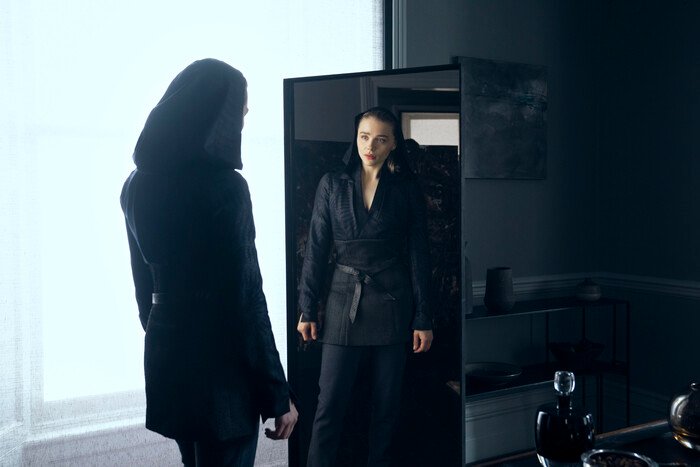
Promotional still of The Peripheral tv series. Source
The lead heroes we are to root for in The Peripheral are a brother and a sister: Burton Fisher (Jack Reynor) and Flynne Fisher (Chloë Grace Moretz). They are both taking care of their mom Ella Fisher (Melinda Page Hamilton), who’s health condition is rather dire. In order to obtain funds for medication their parent needs, both are involved in gaming in digital simulations and virtual reality. One day they get their hands on a VR headset, designed by a mysterious company in Bogotá, Colombia. Soon after that events are set off that bring relentless killers to the quiet Clanton town in North Carolina, which is where the siblings live.
While Flynne is one who spends more time with the aforementioned headset, which turns out to provide its user with some Avatar-like experience, Burton as ex forces has got a Haptic systems technology built in his body, which helps the efficiency in combat situations. This is what makes the reality of 2030s in the series a lot more interesting than if it all was the usual score settling the Wild West style. Burton’s squad, despite not being on active duty, is still there, all of whom have got the same technology Burton has. Luckily for us, viewers, The Peripheral team had not been in mood for slow burn, and all the combat skills and technology of Burton’s squad gets put into action early on in the series, stating clearly: they mean business.
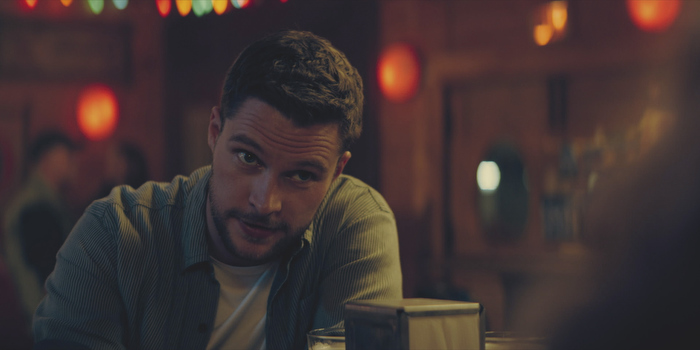
Jack Reynor as Burton Fisher in The Peripheral series. Source
A character, which might stay in viewer’s memory more vividly, is Conner Penske (Eli Goree) – a physically disabled vet, who’d served alongside Burton. Conner is moving around thanks to an elaborate, custom made mechanical metal vehicle. The reason why Conner’s character is memorable in the first place are the conversations between him and Burton that reveal frustrations and anxiety related to his condition. Those moments also reveal the support Burton is providing as a friend. Those are among the strongest performances in the series, in my opinion. Burton Fisher is that son, that brother, that friend who stays true to his lifetime mission – being a soldier, at all times, and everyone can rely on his word, sound judgement and support; Jack Reynor’s character lives and breathes army in this series. Which looks like the reason why Conner is the No. 1 choice for special missions that involve the “virtual reality” of The Peripheral: Burton Fisher knows how to provide Conner’s life with more meaning. Unsurprisingly though, Conner ends up having ideas regarding his further existence that don’t sound very promising to Burton.
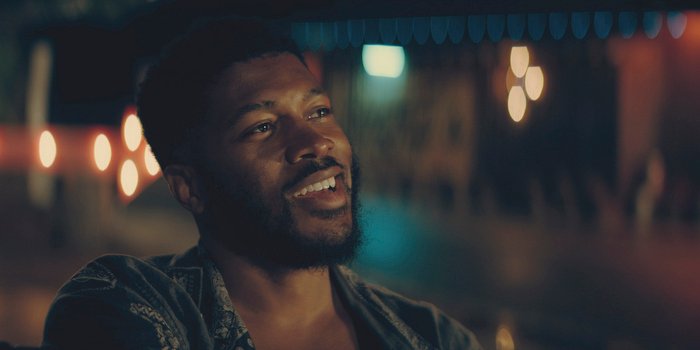
Eli Goree as Conner Penske in The Peripheral series. Source
Meanwhile Flynne is a single young woman working in a 3D printing shop. The life of Grace Moretz’s character can be split into two realities: one is that of a provincial girl in a small town in the US, another one is that of an increasingly sophisticated young woman in upper circles in London. This latter one many times looks like she is preparing to go on a date with Gary Carr’s Wilf Netherton, but it somehow always ends up not happening, which makes Wilf mostly a solemn and melancholic character. See, my dear reader, Flynne is not someone to busy herself with amorous ventures, when there is so much to explore and fights to fight.
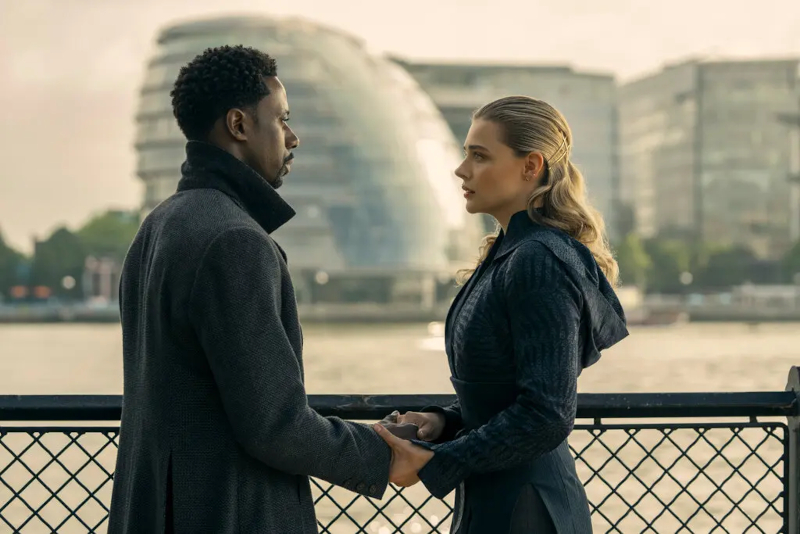
Gary Carr as Wilf Netherton and Chloë Grace Moretz as Flynne Fisher in The Peripheral series. Source
It is not always clear what and why Flynne has to fight, but those that have a lot to do with all that are JJ Feild’s Lev Zubov and T'Nia Miller’s Cherise Nuland. These two characters had been designed to be extremely relaxed, and ruthless at the same time. In their world they each have got a lot of power, which in a weird way turns them into cool, refined and worldly Mom and Pop actors and poets; this is particularly noticeable in a scene with breakfast table, where they face each other and have a conversation with a significance for the whole Season 1 of the series.
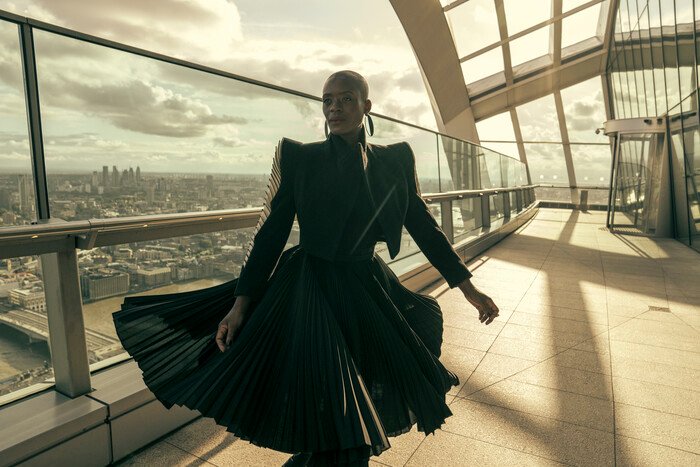
T'Nia Miller as Cherise Nuland in The Peripheral series. Source
Lastly a villain named Corbell Pickett should be mentioned. In the first paragraph of this writing the word “corruption” was mentioned; Mr. Pickett is the main reason for that. Everything in Clanton town happens according to Pickett’s vision. His belief is that thanks to him Clanton is a good and quiet place to live in; it is basically a testament to his talent of running things. The character is played by Louis Herthum, who was a werewolf JD Carson in True Blood series and Peter Abernathy in Westworld.
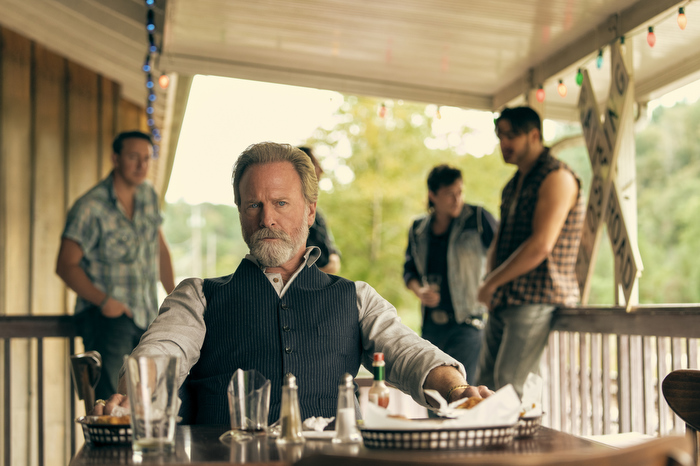
Louis Herthum as Corbell Pickett in The Peripheral series. Source
While The Peripheral indeed comes across as series off the beaten track, finely combining action thriller feats with high tech sci-fi, it does serve to provoke a thought: what would William Gibson’s novel had looked like if turned into miniseries? Amazon’s series feels like an intelligent venture with well familiar business and marketing goals, but among those who’d love to see a screen adaptation of a novel, which in itself is complete, there’s likely gonna be the feeling they've watched a spin-off rather than the real deal. At the same time, there’s no denying; the idea that the series and the final instalment in the trilogy are both worked on at the same time is exciting news to everyone. It does let one speculate there’s some surprise prepared somewhere off the beaten track in the near future.
Read my review of 2020 movie Shadow in the Cloud with Chloë Grace Moretz in the lead role here.
Read my review of Johnny Mnemonic – a movie written by William Gibson, here.
Read my short review of David Cronenberg's eXistenZ here.






